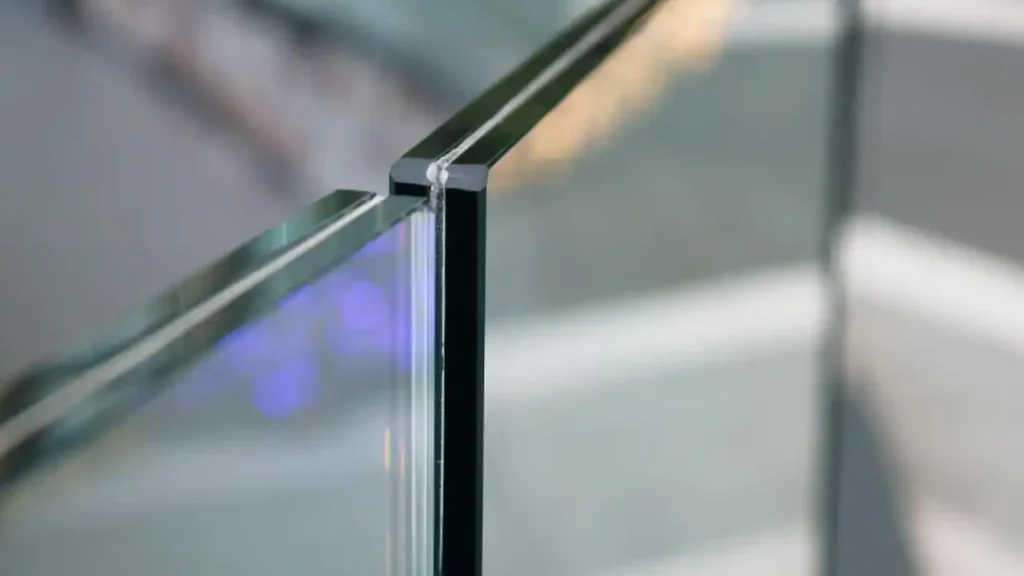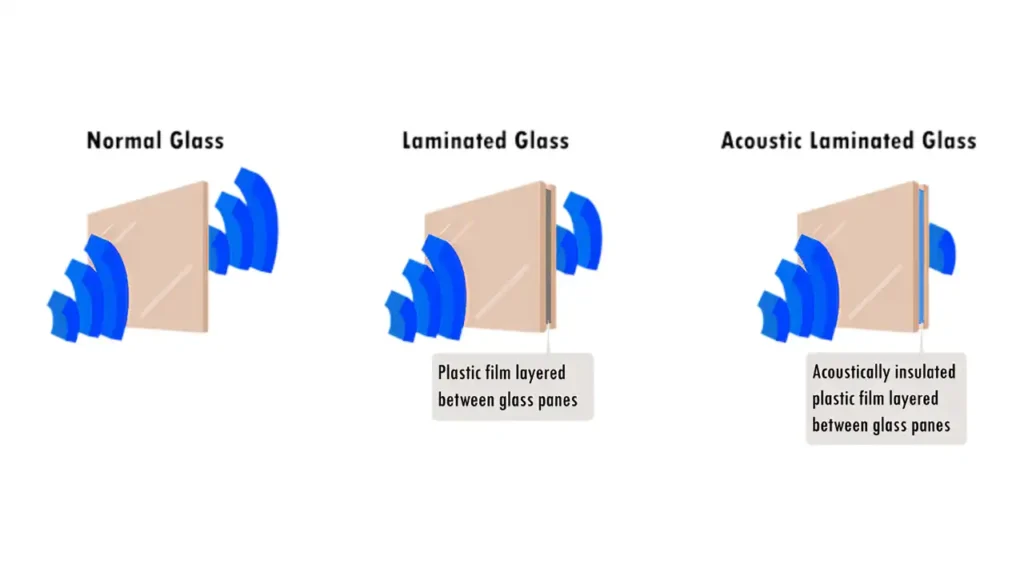Ever wondered how to create a peaceful oasis in a noisy world? Acoustic glass might just be the answer you’ve been searching for.
In this blog post, we’ll delve into the fascinating world of acoustic glass, exploring its unique properties, applications, and benefits.
Whether you’re looking to enhance your home’s privacy, improve productivity in your office, or simply escape the hustle and bustle of everyday life, acoustic glass offers a versatile and effective solution.
So, let’s dive in and discover the power of this remarkable material.
What is Acoustic Glass

Acoustic glass is a specialized type of glass that is designed to reduce noise transmission. It is typically constructed with multiple layers of glass bonded together with one or more acoustic interlayers, such as polyvinyl butyral (PVB). These interlayers help to absorb and dampen sound waves, making it more difficult for them to pass through the glass.
Acoustic glass is often used in environments where noise reduction is a priority, such as:
- Residential homes: To block noise from traffic, neighbors, or other sources.
- Commercial spaces: To create quieter workspaces, improve customer experiences, or enhance privacy in offices, hotels, restaurants, and retail stores.
- Public spaces: To reduce noise levels in libraries, schools, hospitals, and other public areas.
By effectively reducing noise transmission, acoustic glass can create a more peaceful and comfortable environment.
What is Acoustic Laminated Glass

Acoustic laminated glass is a type of glass that is specifically designed to reduce noise transmission. It is constructed by bonding together multiple layers of glass with one or more acoustic interlayers, typically made of polyvinyl butyral (PVB).
The PVB interlayer acts as a sound-absorbing material, helping to dampen and absorb sound waves that attempt to pass through the glass. This results in a significant reduction in noise levels, making acoustic laminated glass an ideal choice for environments where quiet and privacy are important.
Common applications for acoustic laminated glass include:
- Residential homes: To block noise from traffic, neighbors, or other sources.
- Commercial spaces: To create quieter workspaces, improve customer experiences, or enhance privacy in offices, hotels, restaurants, and retail stores.
- Public spaces: To reduce noise levels in libraries, schools, hospitals, and other public areas.
Acoustic laminated glass is an effective and versatile solution for improving sound insulation and creating a more peaceful and comfortable environment.
How to Tell if Glass is Acoustic?

Here are some visual and functional clues to help you determine if a piece of glass is acoustic:
Visual Clues:
- Thickness: Acoustic glass is typically thicker than regular glass.
- Layers: Look for evidence of multiple layers of glass bonded together.
- Interlayer: You might be able to see a slight discoloration or opacity in the interlayer between the glass layers.
Functional Clues:
- Noise Reduction: If the glass effectively blocks noise from outside or between rooms, it’s likely acoustic glass.
- Weight: Acoustic glass is generally heavier than regular glass due to the additional layers and interlayer.
- Label or Certification: Check for any labels or certifications indicating that the glass is acoustic or soundproof.
If you’re unsure, it’s always best to consult with a professional or the manufacturer to verify whether a specific piece of glass is acoustic.
Does Acoustic Glass Make a Difference?
Yes, acoustic glass can make a significant difference in reducing noise transmission.
It is specifically designed to block sound waves, creating a quieter and more peaceful environment. The effectiveness of acoustic glass depends on factors such as the thickness of the glass layers, the type of interlayer used, and the overall design of the glass panel. However, when properly installed and maintained, acoustic glass can provide a noticeable improvement in noise reduction.
How Does Acoustic Glass Work?

Acoustic glass works by utilizing a combination of materials and techniques to reduce noise transmission.
Here’s a breakdown of how it functions:
- Multiple Glass Layers: Acoustic glass typically consists of two or more layers of glass bonded together. This layered structure helps to create a barrier against sound waves.
- Acoustic Interlayers: Between the glass layers, acoustic interlayers are incorporated. These interlayers are often made of materials like polyvinyl butyral (PVB), which have excellent sound-absorbing properties.
- Sound Wave Absorption: When sound waves encounter the acoustic glass, they are partially absorbed by the interlayers. The PVB material in the interlayers helps to dissipate the energy of the sound waves, reducing their transmission through the glass.
- Mass Law: The mass of the glass layers also plays a role in noise reduction. The thicker the glass layers, the more effective they are at blocking sound waves. This is known as the “mass law” of sound insulation.
By combining these elements, acoustic glass can significantly reduce noise transmission, creating a quieter and more peaceful environment.
How Much is Acoustic Glass?

The cost of acoustic glass can vary depending on several factors, including:
- Thickness: Thicker glass generally offers better sound insulation and can be more expensive.
- Number of layers: Multiple layers of glass and interlayers can increase the cost.
- Type of interlayer: Different interlayers may have varying costs.
- Size and shape of the glass panel: Larger or more complex shapes can increase the price.
- Installation costs: The cost of professional installation should also be considered.
It’s important to obtain quotes from multiple suppliers to get a better understanding of the pricing for acoustic glass in your specific region.
Would you like me to provide you with some resources where you can find more information about acoustic glass pricing?
How Effective Is Acoustic Glass at Reducing Sound?
Acoustic glass can be highly effective at reducing noise transmission. The level of noise reduction depends on several factors, including:
- Thickness of the glass layers: Thicker glass generally offers better sound insulation.
- Type of interlayer: Different interlayers have varying sound-absorbing properties.
- Number of glass layers and interlayers: Multiple layers can provide more effective noise reduction.
- Installation quality: Proper installation is essential for optimal performance.
- Frequency of the sound: Acoustic glass may be more effective at blocking certain frequencies of sound than others.
While acoustic glass can significantly reduce noise levels, it’s important to note that it may not completely eliminate all sound. However, it can be a valuable tool for creating a quieter and more peaceful environment.
Is Acoustic Glass Better Than Triple Glazing?

The effectiveness of acoustic glass versus triple glazing can vary depending on specific circumstances. Both options offer noise reduction benefits, but each has its own advantages:
Acoustic Glass:
- Customization: Acoustic glass can be tailored to specific noise reduction requirements by varying the thickness of the glass layers and the type of interlayer used.
- Higher Noise Reduction: In general, acoustic glass can achieve higher levels of noise reduction compared to triple glazing, especially when using specialized interlayers.
- Aesthetics: Acoustic glass can be designed with various finishes and styles to match different architectural preferences.
Triple Glazing:
- Energy Efficiency: Triple glazing is often more energy efficient than double glazing, which can be a significant advantage in certain climates.
- Cost: Triple glazing may be a more cost-effective option in some cases, especially if energy efficiency is a primary concern.
- Installation: Triple glazing might be easier to install in existing window frames compared to acoustic glass, which may require more extensive modifications.
Ultimately, the best choice between acoustic glass and triple glazing will depend on your specific needs, budget, and the level of noise reduction required. It’s recommended to consult with a professional to assess your situation and determine the most suitable option for your project.
Conclusion
Acoustic glass offers a powerful solution for creating quieter, more comfortable, and productive environments. By understanding its unique properties, applications, and benefits, you can make informed decisions about incorporating acoustic glass into your home, office, or public space.
From reducing noise pollution to enhancing privacy and improving overall well-being, acoustic glass provides a versatile and effective solution.
Ready to experience the transformative power of acoustic glass? Contact us today to learn more about our high-quality wholesale acoustic glass products and get a quote tailored to your specific needs.
